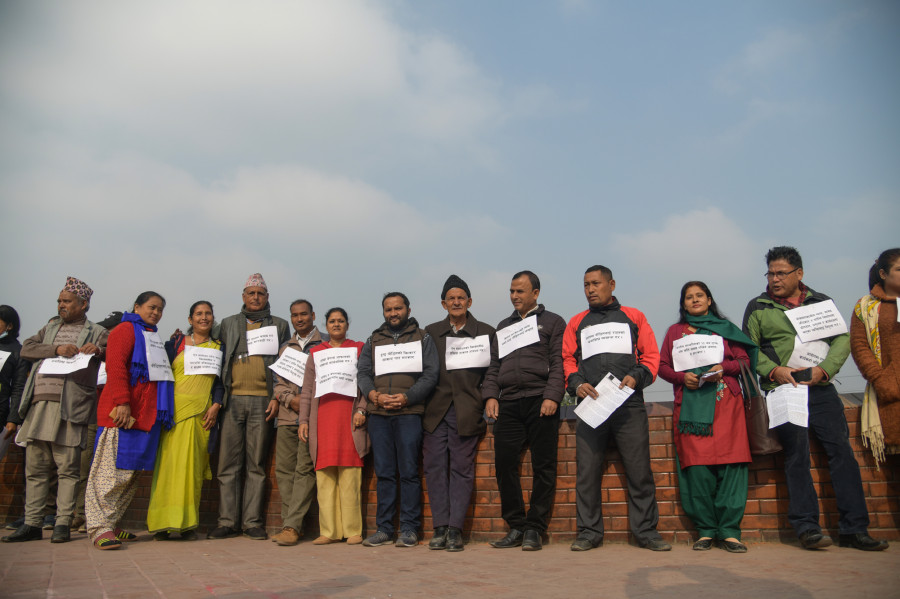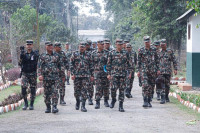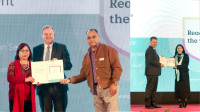National
Rights groups’ statement shows the world is watching Nepal’s transitional justice process, experts say
The statement from four prominent human rights organisations is stronger than ones issued in the past, indicating the international community may be gradually losing faith in Nepal’s system.
Binod Ghimire
Amid serious concerns from conflict victims over the politicisation in the selection of teams in two transitional justice bodies, international human rights organisations have urged the Nepal government to maintain transparency in the appointment process.
In a joint statement issued on Tuesday, International Commission of Jurists, Amnesty International, Human Rights Watch and TRIAL International expressed concerns over the appointment of the chairpersons and members in the transitional justice commissions without making necessary reforms in the legal framework.
The four organisations have also called to amend the existing Transitional Justice Act without further delay. The Supreme Court in February 2015 directed the Nepal government to revise the Act to make it consistent with the international human rights standards. The court had struck down almost a dozen provisions in the Act and directed the government to ensure that no amnesty is awarded in cases of serious human rights violations committed during the decade-long insurgency. However, four years after the ruling, the government is yet to start the amendment process.
Read: Conflict victims decry apathy of government and parties towards transitional justice
Though the government had announced that it’d start the consultation to collect the suggestions from the concerned parties after the festival season is over, there has been no indication that the process would start anytime time soon. Officials at the Ministry of Law and Justice say no concrete homework has been done to commence the consultation phase of the process.
The four human rights organisations have also urged the Nepal government to initiate genuine consultative and transparent process for the appointment of the chairpersons and the members in the commissions.
“The commissions will not gain the trust of the victims and the international community if the political parties continue to interfere in the appointment process,” said Biraj Patnaik, South Asia Director at Amnesty International, in the statement.
Human rights experts say Nepal government must take a serious note of Tuesday’s statement, saying the statement is an indication that the world is watching how the transitional justice process is being dealt with by the country.
“Human rights is the issue of universal jurisdiction. If it is not concluded properly here, it might go away from Nepal’s hand,” Ram Dayal Rakesh, a former member of National Human Rights Commission, told the Post.
Under the principle of universal jurisdiction, states may make it possible for their domestic criminal justice system to investigate and prosecute crimes such as torture, committed by any person, anywhere in the world. This is more likely if the Nepali authorities do not appear able and willing to prosecute those responsible for such crimes, the organisations said.
“After initial pledges to ensure truth, justice, and reparations for conflict victims, it appears that the government is once again determined to protect those responsible for the crimes,” Meenakshi Ganguly, South Asia director at Human Rights Watch, said in the statement. “The international community should remind Nepal that whitewashing egregious crimes will not help to dodge universal jurisdiction.”
In a separate statement on Tuesday, National Human Rights Commission said there should be no political intervention in the selection of the new teams in the Truth and Reconciliation Commission and the Commission of Investigation on Enforced Disappeared Persons.
“The recommendation committee must ensure impartiality, fairness and transparency in the selection process,” the constitutional human rights watchdog said.
In the strongly-worded statement, rights bodies said Nepal has made no real process in delivering the justice, truth and reparations while the impunity and denial of access to justice to the victims remain prevalent. Though the conclusion of the transitional justice process was one of the crucial agenda of the Comprehensive Peace Agreement signed on November 21, 2006, it never became the priority of the successive governments.
“It is astonishing that so little progress has been made in responding to the clearly articulated concerns and demands of conflict victims,” said Frederick Rawski, ICJ’s Asia-Pacific Director. “These demands have included a transparent and consultative process for the appointment of commissioners, and a genuine good-faith effort by political leaders and lawmakers to address serious weaknesses in the existing legal framework.”
Rights experts say they hope the Nepal government and the major political parties internalise the position of the international community which has been reflected clearly through the statement. For them, the statement is a message that if the government and the parties do not correct their way of dealing with the sensitive issue, they will gradually lose faith in the country’s system.
“The government and the parties must support a credible and transparent process if they don’t want the cases of human rights violations during the insurgency to get internationalised,” Charan Prasai, a human rights activist, told the Post. “How long can they fool the victims and the international community?”




 8.26°C Kathmandu
8.26°C Kathmandu














